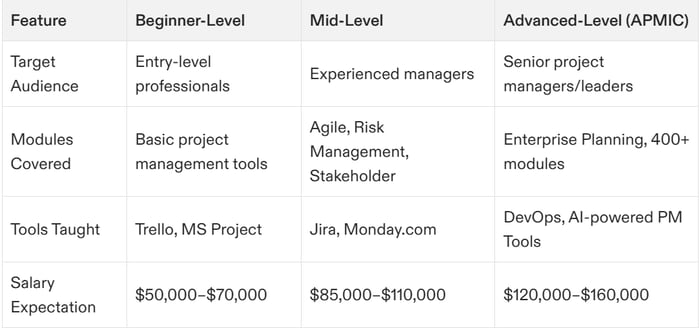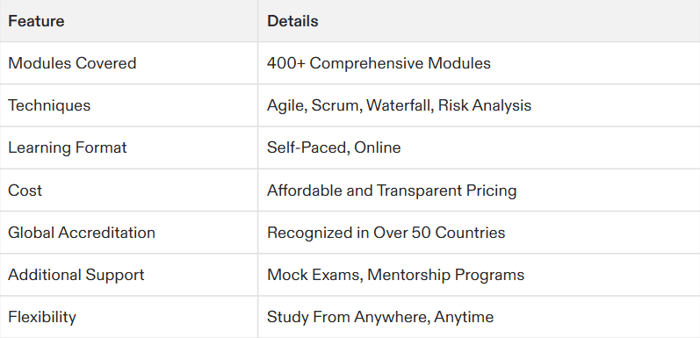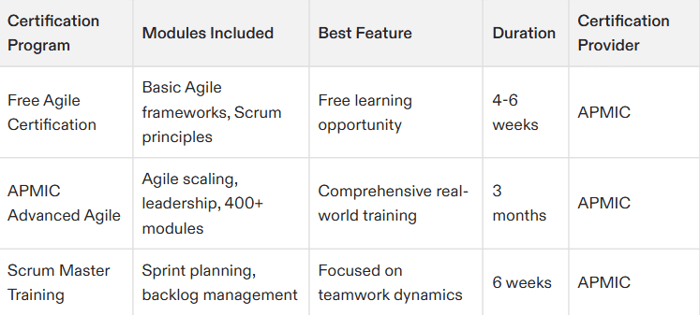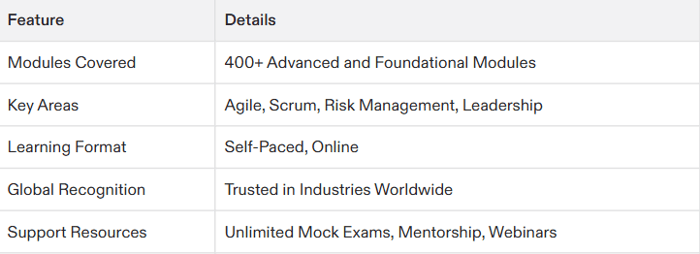Table of Contents
- Introduction
- What Are Project Management Certification Levels?
- Beginner-Level Certifications – Courses for Newcomers
- Mid-Level Certifications – Moving Toward Professional Expertise
- Advanced Certifications – Shaping Leaders in Project Management
- Salary Insights Based on Certification Levels
- FAQs on Project Management Certification Levels
- 1. What are the most common project management certification levels?
- 2. Which certification is best for a beginner in project management?
- 3. How does APMIC Certification differ from others?
- 4. Do all certifications offer the same salary benefits?
- 5. Can I upgrade from a beginner to an advanced level later?
- Comparing Certifications – Features of APMIC and Other Programs
- Final Thoughts
Introduction
The project management field offers abundant opportunities for those who are keen to sharpen their skills and climb the career ladder. But the world of certifications can be overwhelming, with programs ranging from beginner levels to advanced credentials designed for seasoned professionals. Understanding project management certification levels is crucial when navigating the intricate world of project management.
By identifying the right certification level, you not only strengthen your resume but also gain knowledge tailored to your current skills and future goals. From entry-level certificates to leadership-focused programs like the APMIC Certification, this blog dives deep into certification paths, their relevance, and the impact they can have on your career trajectory.
Table of Contents
- What Are Project Management Certification Levels?
- Beginner-Level Certifications – Courses for Newcomers
- Mid-Level Certifications – Moving Toward Professional Expertise
- Advanced Certifications – Shaping Leaders in Project Management
- Salary Insights Based on Certification Levels
- FAQs on Project Management Certification Levels
- Comparing Certifications – Features of APMIC and Other Programs
What Are Project Management Certification Levels?
Project management certification levels differentiate certifications based on the depth of knowledge they deliver and the candidate’s experience level they cater to. These levels ensure professionals of all expertise—from fresh graduates to seasoned managers—can find a program that suits their career stage.
Whether you're starting your project management career or aiming for a C-suite position, understanding these levels helps streamline your learning path.
Key levels include:
- Beginner-Level Certification (Entry-level/Foundational programs)
- Mid-Level Certification (Professional growth and specialization)
- Advanced Certification (Comprehensive leadership-focused programs like APMIC Certification with 400+ modules)
Beginner-Level Certifications – Courses for Newcomers
Professionals just stepping into the field of project management often start with beginner-level certifications. These programs focus on basic project management principles, tools, and techniques.
Features of Beginner-Level Certifications
- Cover fundamental methodologies like Waterfall and Agile.
- Provide knowledge in basic tools such as MS Project and Trello.
- Ideal for individuals with no project management background or those transitioning into the field.
Examples
- Certified Associate in Project Management (CAPM)
- Designed for entry-level learners.
- Google Project Management Certificate
- Widely accessible; suits those looking at generalist project roles.
Salary Expectation
Certified entry-level professionals can earn between $50,000 and $70,000 annually, depending on their location and industry.
Mid-Level Certifications – Moving Toward Professional Expertise
Mid-level project management certification levels are perfect for professionals with some experience managing projects who want to solidify their expertise and gain deeper insights into advanced methodologies.
Features of Mid-Level Certifications
- Programs often focus on managing large-scale projects, stakeholder collaboration, and risk management.
- Candidates gain hands-on experience with tools like Jira, Smartsheet, or Monday.com.
- Start to touch on leadership elements like personal productivity management and team resource optimization.
Examples
- Project Management Professional (PMP)
- Recognized globally for its industry-aligned training.
- ITIL Foundation (specific for IT Projects)
- IT-industry-specific, emphasizing high service levels.
Ideal Candidates
Professionals with 2–5 years of experience in managing teams or handling medium-complexity projects.
Salary Expectation
Mid-level certified professionals often command salaries between $85,000 and $110,000 annually.
Advanced Certifications – Shaping Leaders in Project Management
At the pinnacle of project management certification levels are programs that prepare candidates for strategic, leadership, and enterprise-wide objectives. Advanced certifications provide a deep understanding of multiple management philosophies and tools, while also emphasizing personal leadership skills.
Features of Advanced Certifications
- Cater to seasoned project managers aspiring for leadership roles like Portfolio Manager or Program Director.
- Offer comprehensive frameworks such as Risk Mitigation, Enterprise-Level Planning, and Agile Transformation.
- Highly customizable learning paths like APMIC Certification, featuring over 400 modules spanning industries and roles.
Examples
- APMIC Certification
- Designed for professionals seeking mastery in their fields.
- Certified Scrum Professional (CSP)
- Advanced Agile project certification.
Who Should Pursue These?
Senior professionals ready to lead organizations through change management processes or those taking on global or highly specialized projects.
Salary Expectation
Advanced certifications often open up salaries from $120,000 to over $160,000 annually, depending on experience and industry.
Salary Insights Based on Certification Levels
Understanding how different project management certification levels influence salary can help professionals plan their career paths effectively. Certification not only enhances earning potential but also opens doors to advanced roles, delivering both immediate and long-term financial benefits. Here's a breakdown of how salary ranges vary by certification level, along with examples of roles and industries where these certifications can make an impact.
Beginner-Level Certifications – Entry-Level Newcomers
These certifications serve as a solid foundation for individuals new to the field of project management. At this stage, professionals often step into roles such as Junior Project Coordinator, Project Assistant, or Entry-Level Project Manager.
- Who Benefits? Career switchers, recent graduates, or technical specialists wanting to incorporate project management skills into their profile.
- Industries Thriving on Entry-Level PMs: Entry-level certifications are popular in startups, small-scale IT firms, and manufacturing units where foundational skills are sufficient for managing straightforward processes.
Certified professionals at this stage typically earn $50,000–$70,000 annually. While this level offers modest salaries, its primary value lies in kick-starting a project management career and laying the groundwork for future advancement.
Mid-Level Certifications – Experienced Managers
Mid-level certifications are a gateway to more substantial responsibilities and rewards. Professionals at this stage often move into roles like Project Manager, Agile Coach, or Operations Manager. They are tasked with leading teams, managing budgets, and ensuring projects are completed on time and within scope.
- Who Benefits? Individuals with 2–5 years of experience in any project-based role seeking to solidify or elevate their expertise.
- Industries Thriving on Mid-Level PMs: Mid-level certifications are particularly valued in healthcare, construction, and SaaS industries, where managing medium-complexity projects and stakeholder expectations are essential.
Professionals certified at this level often achieve salaries between $85,000 and $110,000 annually, depending on their location, company size, and the complexity of projects they handle. Mid-level certifications are the sweet spot for significant salary hikes while gaining experience in diverse project scopes.
Advanced Certifications – Senior Leaders
The advanced-level training provided by certifications like APMIC Certification equips professionals with the skills necessary to manage enterprise-wide initiatives and strategic objectives. These certifications prepare individuals for leadership roles such as Portfolio Manager, Program Director, or even Chief Project Officer.
- Who Benefits? Seasoned professionals who are already well-versed in project management and looking to take on broader, high-impact roles involving strategic decision-making and transformation projects.
- Industries Thriving on Advanced PMs: Certifications at this level shine in IT infrastructure, aerospace, pharmaceutical industries, and governments, where complex, multi-level projects demand expertise in risk management, stakeholder alignment, and high-level planning.
Professionals with advanced certifications often secure salaries ranging from $120,000 to $160,000+. Employers in sectors like cybersecurity and AI/ML startups prioritize candidates with these certifications due to their expertise in adapting to rapidly evolving technological landscapes.
The Bottom Line
From entry-level to advanced certifications, investing time and resources in developing your project management skills opens up incredible earning potential. While beginner-level certifications offer a solid start, advanced certifications like APMIC unlock doors to senior management positions, ensuring sustained salary growth and job security over the course of your career. Knowing where you stand and where you want to go makes all the difference in maximizing your financial and professional success.
FAQs on Project Management Certification Levels
1. What are the most common project management certification levels?
The main levels include entry-level (Beginner Certifications), mid-level, and advanced certifications, each catering to specific career stages and professional development needs.
2. Which certification is best for a beginner in project management?
Programs like Google Project Management Certificate or CAPM are excellent entry-level choices. They focus on foundational skills and beginner-friendly tools.
3. How does APMIC Certification differ from others?
The APMIC Certification is an advanced program featuring over 400 specialized modules. It’s ideal for senior managers aiming to lead global teams or large-scale projects.
4. Do all certifications offer the same salary benefits?
No. Salary benefits align with the level and recognition of the certification. Advanced certifications like APMIC significantly boost earning potential compared to basic ones.
5. Can I upgrade from a beginner to an advanced level later?
Yes! Many professionals start with beginner-level certifications and gradually progress to advanced ones as their experience and ambitions grow.
Comparing Certifications – Features of APMIC and Other Programs
Final Thoughts
The right project management certification levels can dramatically shift your career trajectory. Whether you're just beginning or looking to take on strategic leadership roles, choosing the appropriate level ensures your knowledge directly aligns with your career goals. While entry-level programs like Google’s are ideal for starting your journey, advanced certifications like APMIC Certification cement your reputation as an industry leader.
Take the time to assess your current position and future ambitions. Investing in the right certifications will help you unlock new opportunities, higher salaries, and a bright future in project management.






